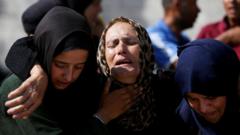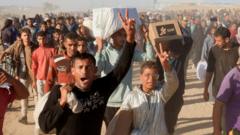In a significant political maneuver, Jordan has enacted a comprehensive ban on the Muslim Brotherhood, citing allegations of planned attacks within its borders. This decisive action poses a potential threat to the Islamic Action Front, the Brotherhood's political faction in Jordan, which recently gained parliamentary influence by opposing Israel's military actions in Gaza.
Jordan Enforces Ban on Muslim Brotherhood Amid Rising Tensions

Jordan Enforces Ban on Muslim Brotherhood Amid Rising Tensions
Jordan's crackdown could dismantle the Islamic Action Front, the country's primary opposition party.
April 23, 2025, saw Jordan's government label the Muslim Brotherhood as a security risk, leading to a blanket prohibition of the group. The Islamic Action Front, which is closely associated with the Brotherhood, has been a significant voice in Jordanian politics after successfully securing representation in the previous year's parliamentary elections. The party has positioned itself as a critic of Israeli military operations and has sought to mobilize public support against perceived foreign intervention.
The Muslim Brotherhood originated in Egypt in 1928, founded by Hassan al-Banna. The movement emerged as both a social and political force, advocating for a return to Islamic principles as a means to resist colonialism and Western influence. Although al-Banna's vision for governance was often vague, the Brotherhood's ideology has proliferated across the Middle East, giving rise to various political entities that operate under its ethos, notably some that maintain direct affiliations with the Brotherhood and others that are considered its pro-generational offshoots.
This recent ban throws into uncertainty the legislative future of the Islamic Action Front, raising concerns about political repression in Jordan and further polarizing political dynamics in the region. The implications of this decision resonate not just within Jordan but throughout the broader Middle East, where the Brotherhood has historically been a central player in political discourse. As tensions escalate, observers will be watching closely to see how this ban affects both local governance and the ongoing regional conflicts.
The Muslim Brotherhood originated in Egypt in 1928, founded by Hassan al-Banna. The movement emerged as both a social and political force, advocating for a return to Islamic principles as a means to resist colonialism and Western influence. Although al-Banna's vision for governance was often vague, the Brotherhood's ideology has proliferated across the Middle East, giving rise to various political entities that operate under its ethos, notably some that maintain direct affiliations with the Brotherhood and others that are considered its pro-generational offshoots.
This recent ban throws into uncertainty the legislative future of the Islamic Action Front, raising concerns about political repression in Jordan and further polarizing political dynamics in the region. The implications of this decision resonate not just within Jordan but throughout the broader Middle East, where the Brotherhood has historically been a central player in political discourse. As tensions escalate, observers will be watching closely to see how this ban affects both local governance and the ongoing regional conflicts.



















